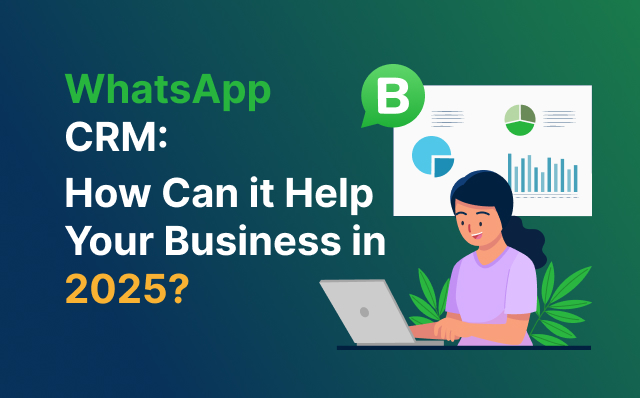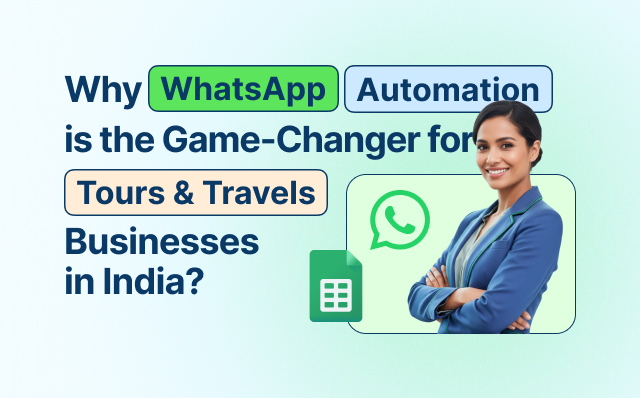To remain competitive in the fast-paced world of today, organizations must stay abreast of the changing trends in communication. With more than 2 billion active users, WhatsApp has become a potent tool for engaging customers. By combining WhatsApp with Customer Relationship Management (CRM) platforms, businesses are now going one step further. As we move towards 2025, WhatsApp CRM integration is becoming a game-changer for businesses across industries.
This blog will explore how WhatsApp CRM can help your business thrive, the benefits it offers, and why 2025 is the year to make the leap.
What is WhatsApp CRM Integration?
WhatsApp CRM integration involves connecting your WhatsApp Business API with a CRM platform like Salesforce, Zoho, HubSpot, or Wati.io. This setup allows businesses to manage customer interactions, automate responses, and store conversations in one unified space. With WhatsApp becoming a primary communication tool, syncing it with your CRM ensures seamless communication with leads and customers.
Key Features of WhatsApp CRM Integration:
- Automated message workflows and alerts
- Centralized customer data and history
- Personalized engagement through WhatsApp templates
- Reporting tools to track customer interactions
- Support for multimedia messaging (images, PDFs, etc.)
Why WhatsApp CRM is Crucial for Business Success in 2025
a) Seamless Communication and Quick Responses
Customers today expect instant responses, and WhatsApp offers a platform to meet those expectations. With WhatsApp CRM integration, businesses can automatically respond to common queries, assign agents to conversations, and provide real-time support. This reduces response time and improves customer satisfaction.
b) Personalized Customer Journeys
Personalization is no longer optional—it’s essential. Integrating WhatsApp with a CRM allows companies to tailor messages based on the customer’s preferences, purchase history, or past interactions. By sending personalized offers, reminders, or updates, businesses can foster stronger relationships.
For example, a retail brand could use WhatsApp to notify a customer about a restocked product they previously showed interest in, boosting engagement and conversions.
Major Benefits of WhatsApp CRM Integration
a) Automation for Efficient Operations
In 2025, automation will play a more significant role in customer service. WhatsApp CRM solutions can automate tasks such as sending order confirmations, booking reminders, or shipping updates. Automation not only saves time but also minimizes the chances of human error.
b) Improved Sales Pipeline Management
WhatsApp is more than just a chat platform; it can also drive sales. With CRM integration, sales teams can track customer inquiries, manage follow-ups, and close deals directly through WhatsApp. CRM tools also provide visibility into the sales funnel, helping managers monitor team performance and conversion rates.
c) Multichannel Integration for Unified Communication
Businesses today need to engage with customers across multiple channels, including email, social media, and messaging apps. A WhatsApp-integrated CRM enables multichannel communication by unifying all interactions in a single interface. This ensures that no message gets lost, and customers receive consistent support across platforms.
Industry Use Cases for WhatsApp CRM Integration
a) E-commerce and Retail
WhatsApp CRM helps e-commerce brands provide quick order updates and handle customer inquiries efficiently. Automated cart abandonment reminders can also nudge potential buyers to complete purchases, increasing revenue.
b) Healthcare
Healthcare providers can use WhatsApp to schedule appointments, send reminders, and share medical reports. With secure integration through CRMs, patient information remains confidential while improving service delivery.
c) Real Estate
For real estate agents, WhatsApp CRM simplifies lead management. Agents can send property details, arrange virtual tours, and follow up with leads through WhatsApp, ensuring a smooth and timely sales process.
How to Implement WhatsApp CRM for Your Business in 2025
To successfully implement WhatsApp CRM integration, businesses need to follow these key steps:
- Choose the Right CRM and WhatsApp Partner:
Platforms like Wati.io, HubSpot, or Zoho offer WhatsApp Business API integration. Evaluate features that align with your business needs. - Get the WhatsApp Business API:
Businesses must apply for the WhatsApp Business API through an official partner. This is essential for sending automated messages and bulk notifications. - Set Up Automated Flows and Templates:
Use the CRM to create message templates for FAQs, order updates, or appointment confirmations. Automating these workflows will improve efficiency. - Train Your Team:
Ensure your customer support and sales teams understand how to use the integrated system. Familiarity with automated responses and message templates is crucial. - Monitor and Optimize Performance:
Track the performance of your WhatsApp campaigns using CRM analytics tools. Use data insights to refine your messaging strategy and improve customer satisfaction.
The Future of WhatsApp CRM Integration: Trends for 2025 and Beyond
As we head into 2025, the following trends are expected to shape WhatsApp CRM integration:
- AI-Driven Chatbots: AI-powered bots will become more intelligent, handling complex customer inquiries and providing human-like interactions.
- Voice Messaging Integration: Businesses will explore voice messages on WhatsApp for faster, personalized communication.
- WhatsApp Payments: With in-chat payment solutions becoming more prevalent, businesses can offer seamless transactions through WhatsApp.
- Omnichannel CRM Systems: CRMs will focus on unifying WhatsApp with other channels like Instagram, Facebook Messenger, and email, creating a holistic customer engagement strategy.
Conclusion
In 2025, WhatsApp CRM integration will be essential for businesses aiming to stay competitive and improve customer engagement. With the ability to automate workflows, personalize messages, and unify communication channels, companies can enhance both operational efficiency and customer experience. Whether you’re in retail, healthcare, or real estate, adopting WhatsApp CRM will help you foster better relationships, close more deals, and stay ahead in a competitive market.
Platforms like Happilee make it easier for businesses to implement WhatsApp CRM solutions effectively. With tools to streamline communication, automate processes, and manage customer interactions seamlessly, Happilee can empower your business to thrive in 2025 and beyond. Now is the time to explore how your business can leverage WhatsApp CRM integration and stay prepared for the future.


